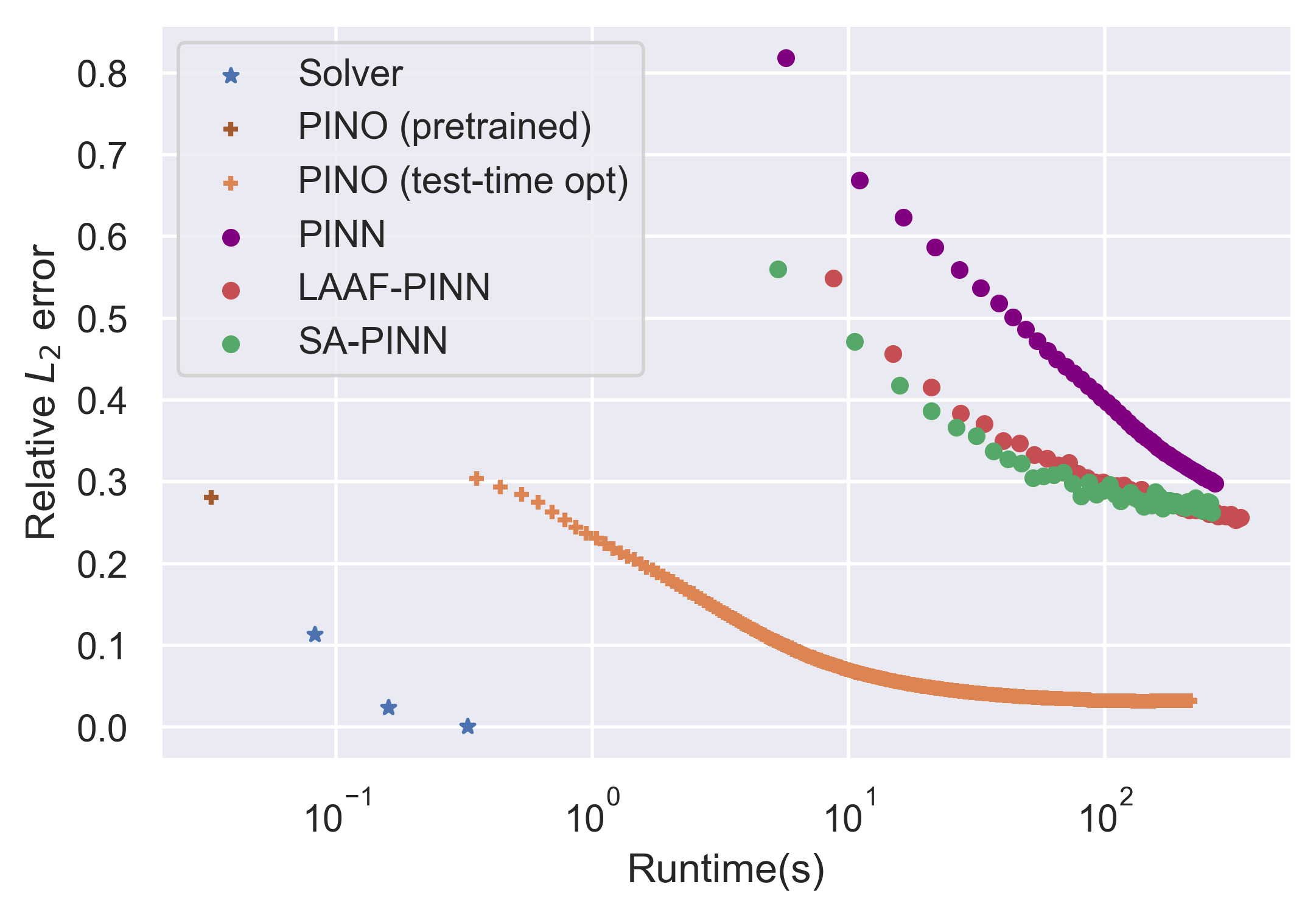Physics-informed Neural Operator for Learning Partial Differential Equation
Abstract: Machine learning methods have recently shown promise in solving partial differential equations (PDEs). They can be classified into two broad categories: solution function approximation and operator learning. The Physics-Informed Neural Network (PINN) is an example of the former while the Fourier neural operator (FNO) is an example of the latter. Both these approaches have shortcomings. The optimization in PINN is challenging and prone to failure, especially on multi-scale dynamic systems. FNO does not suffer from this optimization issue since it carries out supervised learning on a given dataset, but obtaining such data may be too expensive or infeasible. In this work, we propose the physics-informed neural operator (PINO), where we combine the operating-learning and function-optimization frameworks, and this improves convergence rates and accuracy over both PINN and FNO models. In the operator-learning phase, PINO learns the solution operator over multiple instances of the parametric PDE family. In the test-time optimization phase, PINO optimizes the pre-trained operator ansatz for the querying instance of the PDE. Experiments show PINO outperforms previous ML methods on many popular PDE families while retaining the extraordinary speed-up of FNO compared to solvers. In particular, PINO accurately solves long temporal transient flows and Kolmogorov flows, while PINN and other methods fail to converge.
- Pytorch 1.8.0 or later
- wandb
- tqdm
- scipy
- h5py
- numpy
- DeepXDE:latest
- Latest code from tensordiffeq github master branch (Not tensordiffeq 0.19)
- tensorflow 2.4.0
- spatial domain:
$x\in (0,1)^2$ - Data file:
- Raw data shape: 1024x421x421
- spatial domain:
$x\in (0, 1)^2$ - temporal domain:
$t\in [0, 49]$ - forcing:
$0.1(\sin(2\pi(x_1+x_2)) + \cos(2\pi(x_1+x_2)))$ - viscosity = 0.001
Data file: nv_V1e-3_N5000_T50.mat, with shape 50 x 64 x 64 x 5000
- train set: -1-4799
- test set: 4799-4999
- spatial domain:
$x\in (0, 2\pi)^2$ - temporal domain:
$t \in [0, 0.5]$ - forcing:
$-4\cos(4x_2)$ - Reynolds number: 500
Train set: data of shape (N, T, X, Y) where N is the number of instances, T is temporal resolution, X, Y are spatial resolutions.
- NS_fft_Re500_T4000.npy : 4000x64x64x65
- NS_fine_Re500_T128_part0.npy: 100x129x128x128
- NS_fine_Re500_T128_part1.npy: 100x129x128x128
Test set: data of shape (N, T, X, Y) where N is the number of instances, T is temporal resolution, X, Y are spatial resolutions.
- NS_Re500_s256_T100_test.npy: 100x129x256x256
- NS_fine_Re500_T128_part2.npy: 100x129x128x128
Configuration file format: see .yaml files under folder configs for detail.
To run PINO for Burgers equation, use, e.g.,
python3 train_burgers.py --config_path configs/pretrain/burgers-pretrain.yaml --mode trainTo test PINO for burgers equation, use, e.g.,
python3 train_burgers.py --config_path configs/test/burgers.yaml --mode testTo run PINO for Darcy Flow, use, e.g.,
python3 train_operator.py --config_path configs/pretrain/Darcy-pretrain.yamlTo evaluate operator for Darcy Flow, use, e.g.,
python3 eval_operator.py --config_path configs/test/darcy.yamlTo do test-time optimization for Darcy Flow, use, e.g.,
python3 run_pino2d.py --config_path configs/finetune/Darcy-finetune.yaml --start [starting index] --stop [stopping index]To run DeepONet, use, e.g.,
python3 deeponet.py --config_path configs/pretrain/Darcy-pretrain-deeponet.yaml --mode train To test DeepONet, use, e.g.,
python3 deeponet.py --config_path configs/test/darcy.yaml --mode testTrain PINO with 800 low-res data and 2200 PDE.
python3 train_pino.py --config configs/operator/Re500-1_8-800-PINO-s.yamlTrain FNO with 800 low-res data and 2200 PDE.
python3 train_pino.py --config configs/operator/Re500-1_8-800-FNO-s.yamlRun instance-wise finetuning
python3 instance_opt.py --config configs/instance/Re500-1_8-PINO-s.yamlTo run operator learning, use, e.g.,
python3 train_operator.py --config_path configs/pretrain/Re500-pretrain-05s-4C0.yamlTo evaluate trained operator, use
python3 eval_operator.py --config_path configs/test/Re500-05s.yamlTo run test-time optimization, use
python3 train_PINO3d.py --config_path configs/***.yaml To train Navier Stokes equations sequentially without running train_PINO3d.py multiple times, use
python3 run_pino3d.py --config_path configs/[configuration file name].yaml --start [index of the first data] --stop [which data to stop]To train DeepONet, use
python3 deeponet.py --config_path configs/[configuration file].yaml --mode trainTo test DeepONet, use
python3 deeponet.py --config_path configs/[configuration file].yaml --mode testTo train and test PINNs, use, e.g.,
python3 pinns.py --config_path configs/baseline/Re500-pinns-05s.yaml --start [starting index] --stop [stopping index]To train and test LAAF-PINN, use, e.g.,
python3 pinns.py configs/baseline/Re500-pinns-05s-LAAF.yaml --start [starting index] --stop [stopping index]To train and test SA-PINNs, first copy the latest code of tensordiffeq under the working directory. Then run:
DDEBACKEND=pytorch python3 pinns.py configs/baseline/Re500-pinns-05s-SA.yaml --start [starting index] --stop [stopping index]To train and test PINNs, use
python3 pinns.py --config_path configs/baseline/NS-50s.yaml --start [starting index] --stop [stopping index]To train and test LAAF-PINN, use, e.g.,
python3 pinns.py --config_path configs/baseline/NS-50s-LAAF.yaml --start [starting index] --stop [stopping index]To run solver, use
python3 run_solver.py --config_path configs/Re500-0.5s.yaml
